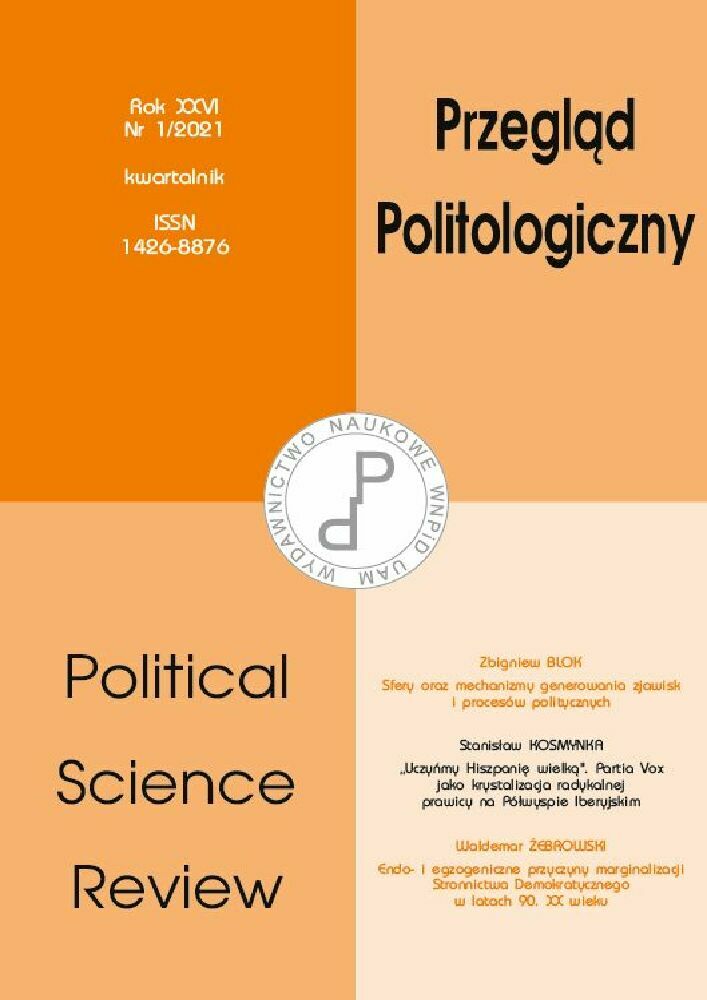Abstract
The author assumes that since political science does not have its own and methodological identity, researchers are each time forced to define the subject of their research and to declare the adopted methodological assumptions. The field of politics is not a homogeneous field, which means that it is filled with various ontological beings. Politics can, therefore, take the form of a method of action, a specific instrument, it can have a real or mythical dimension, it can be an object that can be observed, and not subject to this process. The article analyzes the most important types of social activity that determine the living conditions of entire societies. Attempts were also made to indicate the spheres and mechanisms which give these phenomena and processes a political character. According to the author, “political” should be sought in the relations that occur between different types of social activity. The adoption of four types of activity means that we can distinguish 4 levels of creating political phenomena and processes: – the first degree field, which creates any type of activity that determines the existence of a society, – the second-degree field, which is formed by two-plane cross-sections, e.g. economic and state society, or state and ideological society, etc. – the third-degree field, defined by the cross-sections of three types of society, e.g. economic, state and ideological – and finally the field of the “core of politics”, which is a cross-section of four types of activity and hence its most important role in creating political phenomena and processes and in explaining politics. The opposite position to the “core” is taken by the “marginalia of politics”, which in favorable circumstances, in the right place and at the right time, can acquire political significance and can create a separate field.
References
Bartz B. (2006), Wartości kulturowe a rozwój gospodarczy (próba typologii i komparatystyki), w: Problemy badawcze i metodologiczne politologii w Polsce, red. A. J. Chodubski, M. J. Malinowski, Gdańsk.
Baudrillard J. (2005), Społeczeństwo konsumpcyjne, jego mity i struktury, Warszawa.
Białobłocki T., Moroz J., Nowina-Konopka M., Zacher L. W. (2006), Społeczeństwo informacyjne – istota, rozwój, wyzwanie, Warszawa.
Blok Z. (1998), Teoria polityki. Studia, Poznań.
Bourdieu P., Wacquant L. (2001), Zaproszenie do socjologii refleksyjnej, Warszawa.
Dylematy cywilizacji informatycznej (2004), red. A. Szewczyk, Warszawa.
Cetwiński O., Karwat M. (2001), Polityka jako homeostat systemu społecznego, w: Metafory polityki, red. B. Kaczmarek, Warszawa.
Easton D. (1975), Analiza systemów politycznych, w: Elementy teorii socjologicznych, Warszawa.
Gołębiowski B. (2001), Polityka jako kultura, w: Metafory polityki, red. B. Kaczmarek, Warszawa.
Gwisziani M. G. (1976), Organizacja i zarządzanie, Warszawa.
Jacyno M. (1997), Iluzje codzienności. O teorii socjologicznej Pierre’a Bourdieu, Warszawa.
Kamiński A. (1976), Analiza systemowa organizacji, Warszawa.
Karwat M. (2001), Polityka jako skoncentrowany wyraz ekonomiki, w: Metafory polityki, red. B. Kaczmarek, Warszawa.
Konsumpcja – istotny wymiar globalizacji kultury (2005), red. A. Jawłowska, M. Kempny, Warszawa.
Krauz-Mozer B. (2009), Metodologia politologii w perspektywie pluralistycznej, w: Demokratyczna Polska w globalizującym się świecie, I Ogólnopolski Kongres Politologii, Wydawnictwo AiP, Warszawa.
Nauka o państwie i polityce (2003), red. J. Tymanowski, Wydawnictwo WSHE, Łódź.
Porębski L. (2001), Elektroniczne oblicze polityki. Demokracja, państwo, instytucje polityczne w okresie rewolucji informacyjnej, Kraków.
Ryszka F. (1988), O tym co „polityczne”. Przyczynek do rozważań z semantyki politycznej, w: Prawo i polityka, Warszawa.
Szacki J. (2005), Historia myśli socjologicznej, Warszawa.
Sielski J. (1997), Pierwotne kategorie aksjologicznej analizy decyzyjnej, Katowice.
Sztompka P. (1975), Analiza systemowa w naukach politycznych (próba rekonstrukcji), w: Metodologiczne i teoretyczne problemy nauk politycznych, red. K. Opałek, PWN, Warszawa.
Woleński J. (1975), Spór o status metodologiczny nauki o polityce, w: Metodologiczne i teoretyczne problemy nauk politycznych, red. K. Opałek, PWN, Warszawa.
Wprowadzenie do teorii polityki (1982), t. I: Metodologiczne problemy nauki o polityce, red. J. P. Gieorgica, Warszawa.

